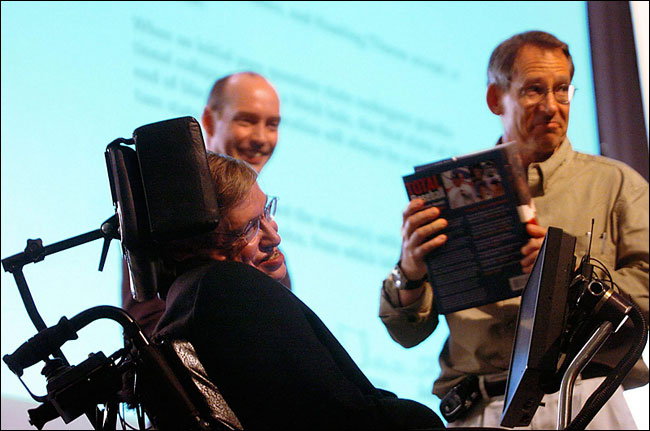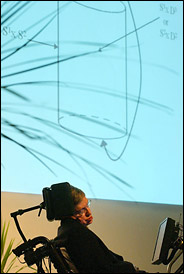About Those Fearsome Black Holes? Never Mind
By DENNIS OVERBYE
The New York Times
Dr. Stephen W. Hawking threw in the towel yesterday, or at least an encyclopedia.
Dr. Hawking, the celebrated
As atonement he presented Dr. John Preskill, a physicist from the California Institute of Technology, with a baseball encyclopedia.
The encyclopedia was the stake in a famous bet Dr. Hawking and another Caltech physicist, Dr. Kip Thorne, made with Dr. Preskill in 1997. Dr. Hawking and Dr. Thorne said information about what had been swallowed by a black hole could never be retrieved from it; Dr. Preskill and many other physicists said it could. The winner was to get an encyclopedia, from which information could be freely retrieved.
This esoteric sounding debate is of great consequence to science, because if Dr. Hawking had been right, it would have violated a basic tenet of modern physics: that it is always possible to reverse time, run the proverbial film backward and reconstruct what happened in, say, the collision of two cars or the collapse of a dead star into a black hole.
Now, on the basis of a new calculation, Dr. Hawking has concluded that physics is safe and information can escape from a black hole. "I want to report that I think that I have solved a major problem in theoretical physics," he told his colleagues, according to a transcript of his remarks.
Standing in front of television cameras, as well as an auditorium full of physicists, Dr. Preskill said he had always dreamed that there would be witnesses when Dr. Hawking conceded, but "this really exceeds my expectations," according to an account by The Associated Press.
Dr. Hawking's new calculation was received by other physicists with reserve. They cautioned that it would take time to understand it. Some of them emphasized that a long line of work by various theorists in recent years suggested that information could escape from black holes.
"Until Stephen's recent reversal, he was about the only person still getting it wrong," said Dr. Leonard Susskind, a theorist at Stanford.
Dr. Hawking spoke yesterday at the 17th International Conference of General Relativity and Gravitation. He was added to the program at the last minute, only two weeks ago, after sending a note to the organizers that he had solved the problem.
His dramatic timing seems sure to add to his legend. Dr. Hawking, 62, has been confined to a wheelchair for decades by amyotrophic lateral sclerosis, or Lou Gehrig's disease, and speaks through a voice synthesizer hooked to a computer on which he types one letter at a time.
Nevertheless, he has been one of the world's leading experts on
gravity,
traveling the world constantly, training generations of graduate
students at
Theorists have worried about the fate of information in black holes since the 1960's. In 1974, Dr. Hawking stunned the world by showing that when the paradoxical quantum laws that describe subatomic behavior were taken into account, black holes should leak and eventually explode in a shower of particles and radiation.
The work was, and remains, hailed as a breakthrough in understanding the connection between gravity and quantum mechanics, the large and the small in the universe.
But there was a hitch, as Dr. Hawking pointed out. The radiation coming out of the black hole would be random. As a result, all information about what had fallen in - whether it be elephants or donkeys - would be erased. In a riposte to Einstein's famous remark that God does not play dice, rejecting quantum uncertainty, Dr. Hawking said in 1976, "God not only plays dice with the universe, but sometimes throws them where they can't be seen."
That was a violation of quantum theory, which says that information is preserved, and quantum theory is a foundation of all modern physics.
Dr. Susskind, who along with Dr. Gerard 't Hooft of
the
The notion that information is always preserved has gained credence from recent results in string theory, which hopes to produce a Theory of Everything that would explain all the forces of nature.
Work by several theorists, including Dr. Andrew Strominger and Dr. Cumrun Vafa, both of Harvard, and Dr. Juan Maldacena, now at the Institute for Advanced Study, has contributed to a strange new view of the universe as a kind of hologram, in which the information about what happens inside some volume of space is somehow encoded on the surface of its boundary.
In such a picture, "there is no room for information loss," Dr. Maldacena explained. But, he added, it does not explain what Dr. Hawking did wrong in 1974 or how information does get out of the black hole.
In his new calculation, Dr. Hawking said that because of quantum uncertainty, one could never be sure from a distance that a black hole had really formed. There is no way to discriminate between a real black hole and an apparent one.
In the latter case an event horizon, the putative point of last return, could appear to form and then unravel; in that case the so-called Hawking radiation that came back out would not be completely random but would have subtle correlations and thus could carry information about what was inside.
According to quantum theory, both possibilities - a real black hole and an apparent one - coexist and contribute to the final answer. The contribution of the no-black-hole possibilities is great enough to suffice to allow information to escape, Dr. Hawking argued.
Another consequence of his new calculations, Dr. Hawking said, is that there is no baby universe branching off from our own inside the black hole, as some theorists, including himself, have speculated.
"I'm sorry to disappoint science fiction fans, but if information is preserved there is no possibility of using black holes to travel to other universes,'' he said yesterday. "If you jump into a black hole, your mass energy will be returned to our universe, but in a mangled form, which contains the information about what you were like, but in an unrecognizable state."
The new results are hardly likely to be the last word, either about
the
black hole information problem or about black-hole travel. Few
physicists agree
with the approach Dr. Hawking is using in his new calculation. Nobody
knows how
to weigh the different possibilities in such a quantum calculation,
said Dr.
Sean Carroll of the
In conceding the bet, Dr. Hawking offered Dr. Preskill a cricket encyclopedia but said that Dr. Preskill, being "all American,'' refused. So Dr. Hawking had a copy of "Total Baseball: The Ultimate Baseball Encyclopedia" flown in.
Dr. Hawking's partner in the bet, Dr. Thorne, is sticking to his guns for now. Dr. Hawking commented, "If Kip agrees to concede the bet later, he can pay me back later."
Copyright 2004 The New York Times
Company
July 22, 2004

